Article Archive
Over the first half of 2025, the US has cut science as never before. This disaster for American science may be a gift to the rest of the world.
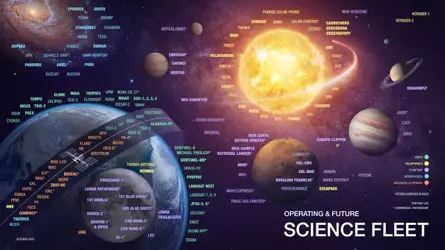
This "fleet chart" catalogues every NASA science mission across the four main subdivisions — Earth science, heliophysics, planetary science, and astrophysics — that is active as of July 2024. Many more planned, future missions are in various stages of development. As of the middle of 2025, more than one-third of these missions are facing immediate cancellation, including missions that are ready for launch and missions that are currently successfully conducting ongoing science operations.
KEY TAKEAWAYS
Since late January of this year, however, all of that has rapidly changed. Many of the most valuable scientific organizations in the world, including NOAA, NASA, the NSF, the CDC, the EPA, and the FDA, have experienced a set of unprecedented internal attacks.
And yet, even if the worst comes to pass, there’s still a reason to be hopeful. Hitler’s destruction of his nation’s science in 1930s Nazi Germany wound up benefiting the rest of the world through an exodus of scientists that became known as Hitler’s gift. Even if American science becomes gutted to the worst imaginable level, science will still survive and thrive in the rest of the world, and we may be witnessing a pivotal moment that leads to the decline of the US and the rise of other scientific and technological national leaders. Here’s the story from a scientist’s perspective.
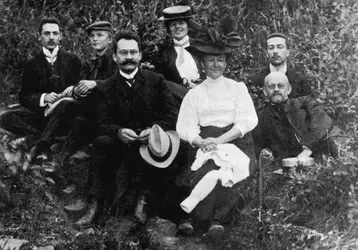
David Hilbert (far right, front row) was one of the most prestigious mathematicians of the 20th century, and led the faculty at Göttingen for many years. The 1933 exodus of Jewish mathematicians was driven by Hitler’s policies, and his statement that, “Our national policies will not be revoked or modified, even for scientists. If [it] means the annihilation of contemporary German science, then we shall do without science…” Hilbert then declared that there was no longer mathematics at Göttingen. Based on publication rates, advances, and breakthroughs made prior to 1933 versus afterward, he was proven quite correct.
In June of 2025, the American Astronomical Society held its annual summer meeting in Anchorage, Alaska. That meeting, one of two annual meetings held by the society, was the very first one held since the 47th President was inaugurated, and the difference between this meeting and all other previous meetings was palpable. Whereas these meetings are normally nearly 100% about astronomy in particular (and science in general), only about a third of people’s attention and conversations were devoted to astronomy. The majority was focused on how to save:
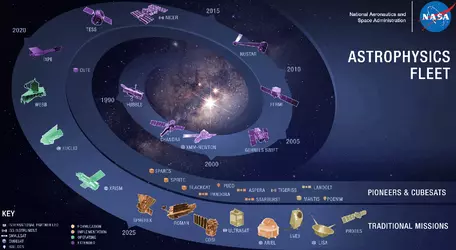
This animation switches between the planned NASA astrophysics fleet, as originally published by NASA in December of 2016, and the current budget proposal for the 2026 fiscal year for NASA astrophysics. With only a few notable exceptions, the entire portfolio of NASA astrophysics missions is slated to be eliminated.
The biggest question that I was asked at that meeting — one that I was asked dozens of times, independently, from a variety of people and groups — is what they should do. Nothing that people had experienced, or that their mentors or advisors or peers had experienced, had prepared them for this moment. The US science ecosystem has long gone hand in hand with federal funding and relies on federal leadership; American science has become great because we invested in science. When Society leadership was asked similar questions, they responded the way that the leadership from many similar scientific societies (in geology, physics, chemistry, etc.) had traditionally responded: with what I’ll call “Plan A” actions.
“Plan A” involves all of the things that scientific societies have done previously when their fields have been threatened by budget cuts. It includes:

On December 25, 2021, the James Webb Space Telescope launched successfully into orbit from an Ariane 5 rocket. Rocketry has been the only way we’ve ever successfully propelled a spacecraft any substantial distances through space, and we’ve successfully used rockets to break the bonds of Earth’s gravity since the late 1950s. Today’s great scientific and technological advances are enabled by a sustained history of society investing in fundamental science and science education.
But today, the situation is one where even if “Plan A” works as well as one can imagine, there are still going to be devastating, unprecedented cuts, and the ones happening in the field of astronomy and astrophysics aren’t atypical; they’re part of a coordinated assault on the very foundations of a scientific American society. Examples include:
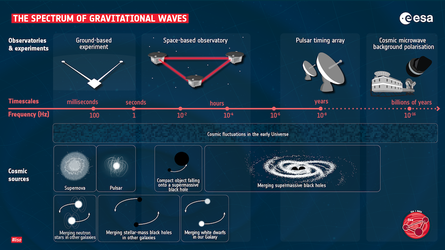
Unlike ground-based gravitational wave detectors like LIGO, Virgo, and KAGRA, or pulsar timing arrays, space-based gravitational wave detectors will be sensitive to new classes of gravitational wave events, including those involving white dwarfs and supermassive black holes. LISA, the Laser Interferometer Space Antenna, is poised to be humanity’s first successful space-based gravitational wave observatory. If the proposed FY2026 budget is enacted, LISA will not be funded or supported by NASA at all.
This would represent a generational loss of science — a loss of already-invested (and already-paying-off) money and talent, of research that’s already providing incredible value, and of human talent. Young people are getting hit especially hard, as graduate/PhD program admissions are at an all-time low for the 21st century, as NSF and NASA grants and fellowships (as well as entire grant/fellowship programs) have been cut off and/or cancelled, and as postdoctoral and research scientist opportunities and positions have been rescinded amid funding uncertainties. It isn’t just astronomy and physics that are suffering — these cuts are representative of those seen today in practically every field of science: biology, ecology, environmental science, geology, meteorology, medicine, virology, and so on.
Even in one particular sub-field of astronomy — in NASA’s vaunted astrophysics division — there are a bunch of NASA astrophysics missions facing cancellation and defunding. At the moment, solar physicists should be celebrating the unprecedented success of the PUNCH mission, tracking space weather from the Sun’s corona all the way to Earth for the first time, the proposed budget would force them to cease operating the Daniel K. Inouye Solar Telescope (DKIST), the world’s flagship ground-based solar observatory. The world’s greatest X-ray telescope, NASA’s Chandra X-ray Observatory, is slated to be entirely defunded. And the Nancy Grace Roman Telescope, NASA’s next scheduled flagship mission after JWST, is completed and just awaiting launch, and yet the proposed funding allotted to the mission is insufficient to pay for such a launch.
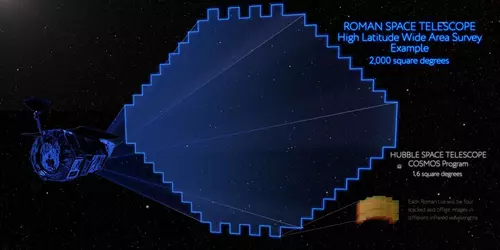
This illustration compares the relative sizes of the areas of sky covered by two surveys: the upcoming Nancy Roman Telescope’s High Latitude Wide Area Survey, outlined in blue, and the largest mosaic led by Hubble, the Cosmological Evolution Survey (COSMOS), shown in red. In current plans, the Roman survey will be more than 1,000 times broader than Hubble’s, revealing how galaxies cluster across time and space as never before, enabling the tightest constraints on evolving dark energy, and revealing more microlensing events, including possibly extremely close black holes, than ever before.
In perhaps the most eerie parallel yet between the US in 2025 and 1930s-era Germany, the Trump administration has severed the subscriptions of several government agencies to journals owned by Springer Nature, one of the world’s most successful and prestigious scientific publishing groups. At least two agencies, the Department of Energy and the Department of Agriculture, are terminating all such contracts, criticizing their politics as “woke” and “corrupt.” This echoes a ban of that very same publisher, and their flagship journal Nature, from all German libraries beginning in 1937 and lasting through the end of World War II.
And yet, as I wrote here back in April, the benefits of science always come back to the society that invests in conducting it. A mass exodus of scientists from Germany in the 1930s included a tremendous number of now-legendary figures: Albert Einstein, Hans Bethe, Max Born, Eugene Wigner, Hans Krebs, Edward Teller, Erwin Schrödinger, Wilhelm Feldberg, Lilli Hornig, and Dieter Gruen, among many others. When Hitler was advised that his dismissal of many scientists would set physics and astronomy back 100 years in Germany, Hitler responded, “Then we’ll work a hundred years without physics and chemistry.”
But here’s the kicker: physics and chemistry are true and real, whether you’re aware of them or not. That exodus of top-tier scientific talent from Germany has since become known as Hitler’s gift, as countries like the United Kingdom and the United States benefited, and benefited tremendously, from the arrival of scientists who no longer had a home in Germany.
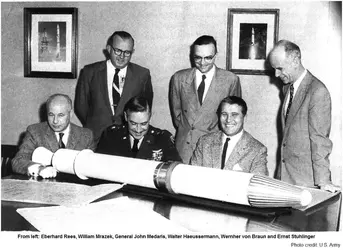
This 1958 photograph shows six scientists in the United States with a model of the Explorer-1 rocket. At far right, Dr. Ernst Stuhlinger is standing, next to Dr. Werner Von Braun (seated). Together, these two men were among the many former Nazis that were brought to the United States as part of Operation Paperclip: to secure their scientific knowledge and talents.
Many people are anxiously waiting to see what happens to the future of American science. Many questions remain unanswered.
What does a “Plan B” look like?
In the most general terms, “Plan B” means looking for opportunities to conduct science and your scientific projects and missions elsewhere: outside of the United States. It looks a lot like “Hitler’s gift” looks, except instead of the US being on the receiving end of this one, it’s the source of the scientific exodus. Many nations have already responded by rising to the challenge.
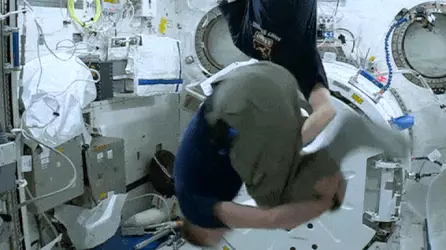
Shown here, an astronaut aboard the International Space Station demonstrates the conservation of angular momentum. A consequence of the symmetry of rotational invariance, the astronaut spins faster only because a torque is applied to him from another astronaut’s body. International collaboration has made many scientific endeavors possible that would have been impossible with solely the investment of one nation alone.
It’s vital to remember that science is a global endeavor; what we learn about reality is just as true in any one part of the world as it is for the entire Universe. Scientists have often decried the siloing of science and the imposition of national borders on knowledge, as international collaboration is often key to achieving the greatest, most profound advances. This is not a new sentiment, either; 17th-century scientist Christiaan Huygens, a contemporary of Newton who came up with the (ultimately superior to Newton’s corpuscular conception of light) wave nature of light, once wrote:
“The world is my country, science is my religion,”
in support of the great idea that humanity and human knowledge should strive to transcend national boundaries.
To that end, it isn’t just the displaced individual scientists who might seek to relocate elsewhere to continue their work and contribute to human knowledge; it’s the projects that are at risk of being defunded and canceled. It might seem like a daunting task. Even in just the field of astronomy and astrophysics, how can a whole slew of projects that are about to suddenly be defunded, including
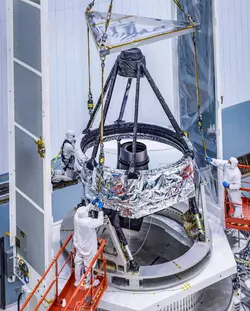
NASA’s Nancy Grace Roman telescope has completed construction and is nearly ready for launch. However, unless sufficient funding comes from the US government to launch and operate it, this telescope is in grave danger of never flying. A “Plan B” of gifting it to a country that would use it, even in defiance of national orders, must remain under consideration.
And yet, there’s a tremendous reason to be optimistic: Other nations are aware of the situation in the US and across the world, and they’re stepping up to invest in science. They know what the model for societal success looks like:
It isn’t as though the US is some special nation, or the only place where NASA and NSF projects can be conducted. The Canadian Space Agency, the European Space Agency, and the Japan Aerospace eXploration Agency are just as capable of managing and launching successful missions as NASA is. The European Southern Observatory and the National Astronomical Observatory of Japan can do ground-based astronomy just as successfully as the National Science Foundation. Although Mauna Kea, based on physical characteristics alone, is the best site for astronomy in the Northern Hemisphere, the summit of La Palma in the Canary Islands is more than capable of hosting any cutting-edge optical or infrared observatory, including the long-awaited Thirty Meter Telescope (TMT).
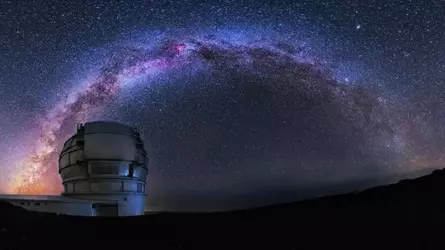
Since scientific observations began at Gran Telescopio Canarias in 2009, it has been the world’s largest single-aperture optical telescope, surpassing even the Keck telescopes atop Mauna Kea. Atop La Palma at the Roque de los Muchachos Observatory, it will someday be surpassed by 30-meter class telescopes, two (GMT and ELT) of which are currently under construction. It is a nearly ideal location for the TMT: the proposed Thirty Meter Telescope.
The nightmare scenario for science isn’t just that the US stops investing in it; it’s that the world would lose the scientific talent that was working to conduct this science, and the benefits of all the projects that the US is threatening to defund and cancel. But there are options, even in the worst-case scenario of the US completely abandoning science and transforming NASA into a real-life version of Starship Troopers, focused on space colonization and the collection of resources.
Over the first half of 2025, the US has cut science as never before. This disaster for American science may be a gift to the rest of the world.

This "fleet chart" catalogues every NASA science mission across the four main subdivisions — Earth science, heliophysics, planetary science, and astrophysics — that is active as of July 2024. Many more planned, future missions are in various stages of development. As of the middle of 2025, more than one-third of these missions are facing immediate cancellation, including missions that are ready for launch and missions that are currently successfully conducting ongoing science operations.
KEY TAKEAWAYS
- Throughout the 20th and the first quarter of the 21st centuries, the US became a world leader in science, technology, healthcare, and education by investing in scientific research.
- In 2025, that is rapidly changing, as unprecedented federal cuts, the defunding and closing of many institutions, and devastatingly reduced budgets present an extinction-level event for American science.
- Just as the exodus of scientists and scientific projects from Nazi Germany became known as “Hitler’s gift” to the rest of the world, the actions of the US today seem similarly poised to reward the rest of the world. Here’s an insider’s view into what’s happening.
Since late January of this year, however, all of that has rapidly changed. Many of the most valuable scientific organizations in the world, including NOAA, NASA, the NSF, the CDC, the EPA, and the FDA, have experienced a set of unprecedented internal attacks.
- Funding streams have been terminated.
- Grants that have been successfully competed for and won have been pulled.
- Fellowships and scholarships have been revoked.
- Contracts have been broken.
- Thousands upon thousands of employees have been terminated, often in defiance of court orders.
And yet, even if the worst comes to pass, there’s still a reason to be hopeful. Hitler’s destruction of his nation’s science in 1930s Nazi Germany wound up benefiting the rest of the world through an exodus of scientists that became known as Hitler’s gift. Even if American science becomes gutted to the worst imaginable level, science will still survive and thrive in the rest of the world, and we may be witnessing a pivotal moment that leads to the decline of the US and the rise of other scientific and technological national leaders. Here’s the story from a scientist’s perspective.

David Hilbert (far right, front row) was one of the most prestigious mathematicians of the 20th century, and led the faculty at Göttingen for many years. The 1933 exodus of Jewish mathematicians was driven by Hitler’s policies, and his statement that, “Our national policies will not be revoked or modified, even for scientists. If [it] means the annihilation of contemporary German science, then we shall do without science…” Hilbert then declared that there was no longer mathematics at Göttingen. Based on publication rates, advances, and breakthroughs made prior to 1933 versus afterward, he was proven quite correct.
In June of 2025, the American Astronomical Society held its annual summer meeting in Anchorage, Alaska. That meeting, one of two annual meetings held by the society, was the very first one held since the 47th President was inaugurated, and the difference between this meeting and all other previous meetings was palpable. Whereas these meetings are normally nearly 100% about astronomy in particular (and science in general), only about a third of people’s attention and conversations were devoted to astronomy. The majority was focused on how to save:
- the careers of many individuals, especially students and early-career astronomers,
- many of the missions, both space-based and ground-based, whose funding has either been threatened or cut off,
- and many of the programs and projects at universities, colleges, and research institutes that rely on grants from the US government.

This animation switches between the planned NASA astrophysics fleet, as originally published by NASA in December of 2016, and the current budget proposal for the 2026 fiscal year for NASA astrophysics. With only a few notable exceptions, the entire portfolio of NASA astrophysics missions is slated to be eliminated.
The biggest question that I was asked at that meeting — one that I was asked dozens of times, independently, from a variety of people and groups — is what they should do. Nothing that people had experienced, or that their mentors or advisors or peers had experienced, had prepared them for this moment. The US science ecosystem has long gone hand in hand with federal funding and relies on federal leadership; American science has become great because we invested in science. When Society leadership was asked similar questions, they responded the way that the leadership from many similar scientific societies (in geology, physics, chemistry, etc.) had traditionally responded: with what I’ll call “Plan A” actions.
“Plan A” involves all of the things that scientific societies have done previously when their fields have been threatened by budget cuts. It includes:
- calling and writing to your congressional representatives and senators,
- getting involved in public policy and showing up, in person, to meet with decision-makers,
- raising public awareness of the issues at stake and attempting to mobilize public sentiment and will,
- voting and advocating for candidates who promoted pro-science positions,

On December 25, 2021, the James Webb Space Telescope launched successfully into orbit from an Ariane 5 rocket. Rocketry has been the only way we’ve ever successfully propelled a spacecraft any substantial distances through space, and we’ve successfully used rockets to break the bonds of Earth’s gravity since the late 1950s. Today’s great scientific and technological advances are enabled by a sustained history of society investing in fundamental science and science education.
But today, the situation is one where even if “Plan A” works as well as one can imagine, there are still going to be devastating, unprecedented cuts, and the ones happening in the field of astronomy and astrophysics aren’t atypical; they’re part of a coordinated assault on the very foundations of a scientific American society. Examples include:
- NASA has laid off over 2500 total workers in two rounds of workforce reductions so far, and is requesting voluntary retirement (or further workforce reduction) of around 3000 additional employees, largely from NASA Science, as opposed to spaceflight or other NASA initiatives. NASA science is currently facing a proposed 47% cut to its overall budget.
- The National Science Foundation, responsible for all federal investment in ground-based astronomy, had 1800 employees lose their headquarters building, right on the heels of having dozens of staff members fired, facing a 57% budget cut proposal, and seeing 1700 grants canceled.
- And, of the 124 NASA missions currently in development or performing operations, 41 of them are facing outright cancellation, with the chief of space policy at The Planetary Society, Casey Dreier, joining many others in warning that these cuts signal “the extinction-level event we were warning people about.”

Unlike ground-based gravitational wave detectors like LIGO, Virgo, and KAGRA, or pulsar timing arrays, space-based gravitational wave detectors will be sensitive to new classes of gravitational wave events, including those involving white dwarfs and supermassive black holes. LISA, the Laser Interferometer Space Antenna, is poised to be humanity’s first successful space-based gravitational wave observatory. If the proposed FY2026 budget is enacted, LISA will not be funded or supported by NASA at all.
This would represent a generational loss of science — a loss of already-invested (and already-paying-off) money and talent, of research that’s already providing incredible value, and of human talent. Young people are getting hit especially hard, as graduate/PhD program admissions are at an all-time low for the 21st century, as NSF and NASA grants and fellowships (as well as entire grant/fellowship programs) have been cut off and/or cancelled, and as postdoctoral and research scientist opportunities and positions have been rescinded amid funding uncertainties. It isn’t just astronomy and physics that are suffering — these cuts are representative of those seen today in practically every field of science: biology, ecology, environmental science, geology, meteorology, medicine, virology, and so on.
Even in one particular sub-field of astronomy — in NASA’s vaunted astrophysics division — there are a bunch of NASA astrophysics missions facing cancellation and defunding. At the moment, solar physicists should be celebrating the unprecedented success of the PUNCH mission, tracking space weather from the Sun’s corona all the way to Earth for the first time, the proposed budget would force them to cease operating the Daniel K. Inouye Solar Telescope (DKIST), the world’s flagship ground-based solar observatory. The world’s greatest X-ray telescope, NASA’s Chandra X-ray Observatory, is slated to be entirely defunded. And the Nancy Grace Roman Telescope, NASA’s next scheduled flagship mission after JWST, is completed and just awaiting launch, and yet the proposed funding allotted to the mission is insufficient to pay for such a launch.

This illustration compares the relative sizes of the areas of sky covered by two surveys: the upcoming Nancy Roman Telescope’s High Latitude Wide Area Survey, outlined in blue, and the largest mosaic led by Hubble, the Cosmological Evolution Survey (COSMOS), shown in red. In current plans, the Roman survey will be more than 1,000 times broader than Hubble’s, revealing how galaxies cluster across time and space as never before, enabling the tightest constraints on evolving dark energy, and revealing more microlensing events, including possibly extremely close black holes, than ever before.
In perhaps the most eerie parallel yet between the US in 2025 and 1930s-era Germany, the Trump administration has severed the subscriptions of several government agencies to journals owned by Springer Nature, one of the world’s most successful and prestigious scientific publishing groups. At least two agencies, the Department of Energy and the Department of Agriculture, are terminating all such contracts, criticizing their politics as “woke” and “corrupt.” This echoes a ban of that very same publisher, and their flagship journal Nature, from all German libraries beginning in 1937 and lasting through the end of World War II.
And yet, as I wrote here back in April, the benefits of science always come back to the society that invests in conducting it. A mass exodus of scientists from Germany in the 1930s included a tremendous number of now-legendary figures: Albert Einstein, Hans Bethe, Max Born, Eugene Wigner, Hans Krebs, Edward Teller, Erwin Schrödinger, Wilhelm Feldberg, Lilli Hornig, and Dieter Gruen, among many others. When Hitler was advised that his dismissal of many scientists would set physics and astronomy back 100 years in Germany, Hitler responded, “Then we’ll work a hundred years without physics and chemistry.”
But here’s the kicker: physics and chemistry are true and real, whether you’re aware of them or not. That exodus of top-tier scientific talent from Germany has since become known as Hitler’s gift, as countries like the United Kingdom and the United States benefited, and benefited tremendously, from the arrival of scientists who no longer had a home in Germany.

This 1958 photograph shows six scientists in the United States with a model of the Explorer-1 rocket. At far right, Dr. Ernst Stuhlinger is standing, next to Dr. Werner Von Braun (seated). Together, these two men were among the many former Nazis that were brought to the United States as part of Operation Paperclip: to secure their scientific knowledge and talents.
Many people are anxiously waiting to see what happens to the future of American science. Many questions remain unanswered.
- Will funding for any of these defunded missions and projects be restored?
- Will many of the laid-off or defunded workers be rehired?
- Will court orders declaring numerous terminations in the federal workforce to be illegal be complied with, or will they continue to be defied?
- And how devastating will the budget that ultimately winds up being enacted for the next fiscal year — which begins not in 2026, but in October of this year — be for American science and American scientists?
What does a “Plan B” look like?
In the most general terms, “Plan B” means looking for opportunities to conduct science and your scientific projects and missions elsewhere: outside of the United States. It looks a lot like “Hitler’s gift” looks, except instead of the US being on the receiving end of this one, it’s the source of the scientific exodus. Many nations have already responded by rising to the challenge.
- Europe has invested nearly a billion dollars in attracting top US scientific talent, includingspecial additional funding for researchers to move their labs/research programs overseas.
- Individual European nations, such as France, have developed special programs to bring in displaced Americans.
- Japan has built a fund of ¥100 billion to attract researchers from abroad, with the Kavli Institute for Physics and Mathematics of the Universe offering additional special postdoctoral positions for displaced scientists.
- Other countries, such as Canada and Australia, are also working to attract displaced American scientists.

Shown here, an astronaut aboard the International Space Station demonstrates the conservation of angular momentum. A consequence of the symmetry of rotational invariance, the astronaut spins faster only because a torque is applied to him from another astronaut’s body. International collaboration has made many scientific endeavors possible that would have been impossible with solely the investment of one nation alone.
It’s vital to remember that science is a global endeavor; what we learn about reality is just as true in any one part of the world as it is for the entire Universe. Scientists have often decried the siloing of science and the imposition of national borders on knowledge, as international collaboration is often key to achieving the greatest, most profound advances. This is not a new sentiment, either; 17th-century scientist Christiaan Huygens, a contemporary of Newton who came up with the (ultimately superior to Newton’s corpuscular conception of light) wave nature of light, once wrote:
“The world is my country, science is my religion,”
in support of the great idea that humanity and human knowledge should strive to transcend national boundaries.
To that end, it isn’t just the displaced individual scientists who might seek to relocate elsewhere to continue their work and contribute to human knowledge; it’s the projects that are at risk of being defunded and canceled. It might seem like a daunting task. Even in just the field of astronomy and astrophysics, how can a whole slew of projects that are about to suddenly be defunded, including
- already-operating projects,
- projects that are near completion but haven’t been finished yet,
- or projects still in the planning/design stages that have already invested substantial resources,

NASA’s Nancy Grace Roman telescope has completed construction and is nearly ready for launch. However, unless sufficient funding comes from the US government to launch and operate it, this telescope is in grave danger of never flying. A “Plan B” of gifting it to a country that would use it, even in defiance of national orders, must remain under consideration.
And yet, there’s a tremendous reason to be optimistic: Other nations are aware of the situation in the US and across the world, and they’re stepping up to invest in science. They know what the model for societal success looks like:
- Invest in hiring scientists and building science facilities.
- Build and maintain the infrastructure and talent that conducts it.
- Reap the rewards of economic prosperity, downstream technology development, and hugely positive returns on investment.
It isn’t as though the US is some special nation, or the only place where NASA and NSF projects can be conducted. The Canadian Space Agency, the European Space Agency, and the Japan Aerospace eXploration Agency are just as capable of managing and launching successful missions as NASA is. The European Southern Observatory and the National Astronomical Observatory of Japan can do ground-based astronomy just as successfully as the National Science Foundation. Although Mauna Kea, based on physical characteristics alone, is the best site for astronomy in the Northern Hemisphere, the summit of La Palma in the Canary Islands is more than capable of hosting any cutting-edge optical or infrared observatory, including the long-awaited Thirty Meter Telescope (TMT).

Since scientific observations began at Gran Telescopio Canarias in 2009, it has been the world’s largest single-aperture optical telescope, surpassing even the Keck telescopes atop Mauna Kea. Atop La Palma at the Roque de los Muchachos Observatory, it will someday be surpassed by 30-meter class telescopes, two (GMT and ELT) of which are currently under construction. It is a nearly ideal location for the TMT: the proposed Thirty Meter Telescope.
The nightmare scenario for science isn’t just that the US stops investing in it; it’s that the world would lose the scientific talent that was working to conduct this science, and the benefits of all the projects that the US is threatening to defund and cancel. But there are options, even in the worst-case scenario of the US completely abandoning science and transforming NASA into a real-life version of Starship Troopers, focused on space colonization and the collection of resources.
- Telescopes and other scientific projects can be shipped overseas, gifted to other countries and agencies that can make good use of them, saving science for humanity.
- Operating space telescopes can be transferred over to partner nations, that could then maintain and operate them remotely.
- And new international partnerships — including, for astronomers, the dream partnership between Europe (and Spain in particular) and Japan — have the potential to create new global powerhouses in science.


